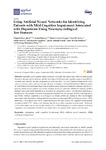Mostrar o rexistro simple do ítem
Using Artificial Neural Networks for Identifying Patients with Mild Cognitive Impairment Associated with Depression Using Neuropsychological Test Features
| dc.contributor.author | Mato-Abad, Virginia | |
| dc.contributor.author | Jiménez, Isabel | |
| dc.contributor.author | García-Vázquez, Rafael | |
| dc.contributor.author | Aldrey, José M. | |
| dc.contributor.author | Rivero, Daniel | |
| dc.contributor.author | Cacabelos, Purificación | |
| dc.contributor.author | Andrade-Garda, Javier | |
| dc.contributor.author | Pías-Peleteiro, Juan M. | |
| dc.contributor.author | Rodríguez-Yáñez, Santiago | |
| dc.date.accessioned | 2018-10-11T14:33:22Z | |
| dc.date.available | 2018-10-11T14:33:22Z | |
| dc.date.issued | 2018-09-12 | |
| dc.identifier.citation | Mato-Abad, V.; Jiménez, I.; García-Vázquez, R.; Aldrey, J.M.; Rivero, D.; Cacabelos, P.; Andrade-Garda, J.; Pías-Peleteiro, J.M.; Rodríguez-Yáñez, S. Using Artificial Neural Networks for Identifying Patients with Mild Cognitive Impairment Associated with Depression Using Neuropsychological Test Features. Appl. Sci. 2018, 8, 1629. | es_ES |
| dc.identifier.issn | 2076-3417 | |
| dc.identifier.uri | http://hdl.handle.net/2183/21153 | |
| dc.description.abstract | [Abstract] Depression and cognitive impairment are intimately associated, especially in elderly people. However, the association between late-life depression (LLD) and mild cognitive impairment (MCI) is complex and currently unclear. In general, it can be said that LLD and cognitive impairment can be due to a common cause, such as a vascular disease, or simply co-exist in time but have different causes. To contribute to the understanding of the evolution and prognosis of these two diseases, this study’s primary intent was to explore the ability of artificial neural networks (ANNs) to identify an MCI subtype associated with depression as an entity by using the scores of an extensive neurological examination. The sample consisted of 96 patients classified into two groups: 42 MCI with depression and 54 MCI without depression. According to our results, ANNs can identify an MCI that is highly associated with depression distinguishable from the non-depressed MCI patients (accuracy = 86%, sensitivity = 82%, specificity = 89%). These results provide data in favor of a cognitive frontal profile of patients with LLD, distinct and distinguishable from other cognitive impairments. Therefore, it should be taken into account in the classification of MCI subtypes for future research, including depression as an essential variable in the classification of a patient with cognitive impairment. | es_ES |
| dc.language.iso | eng | es_ES |
| dc.publisher | M D P I AG | es_ES |
| dc.relation.uri | https://doi.org/10.3390/app8091629 | es_ES |
| dc.rights | Atribución 3.0 España | es_ES |
| dc.rights.uri | http://creativecommons.org/licenses/by/3.0/es/ | * |
| dc.subject | Depression | es_ES |
| dc.subject | Mild cognitive impairment | es_ES |
| dc.subject | MCI | es_ES |
| dc.subject | Artificial neural networks | es_ES |
| dc.subject | ANN | es_ES |
| dc.subject | Neuropsychological test | es_ES |
| dc.title | Using Artificial Neural Networks for Identifying Patients with Mild Cognitive Impairment Associated with Depression Using Neuropsychological Test Features | es_ES |
| dc.type | info:eu-repo/semantics/article | es_ES |
| dc.rights.access | info:eu-repo/semantics/openAccess | es_ES |
| UDC.journalTitle | Applied Sciences | es_ES |
| UDC.volume | 8 | es_ES |
| UDC.issue | 9 | es_ES |
| UDC.startPage | 1629 | es_ES |
| dc.identifier.doi | 10.3390/app8091629 |
Ficheiros no ítem
Este ítem aparece na(s) seguinte(s) colección(s)
-
GI-ISLA-Artigos [19]






